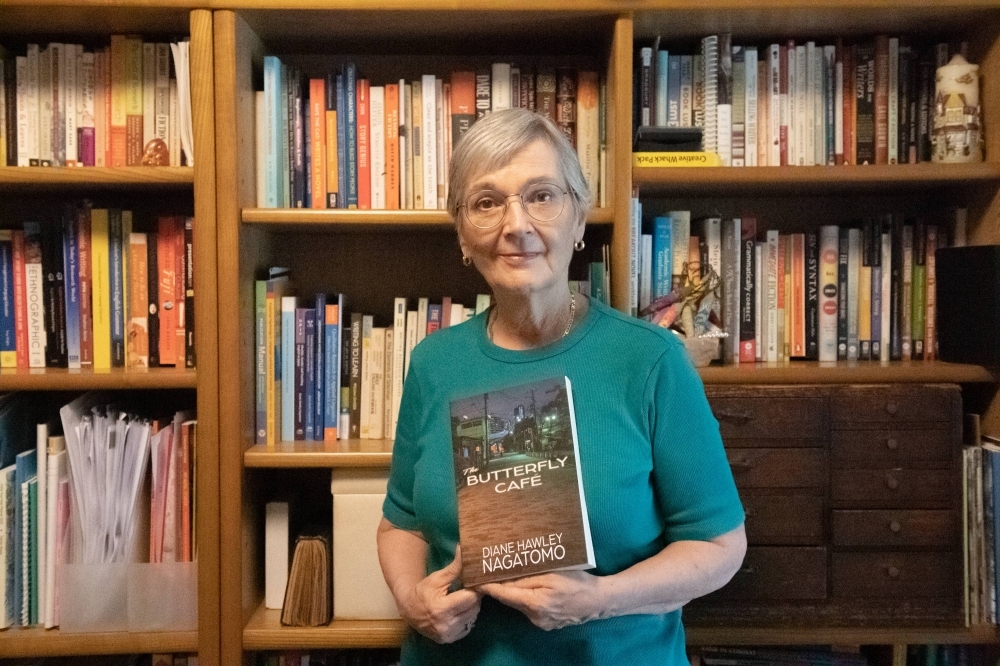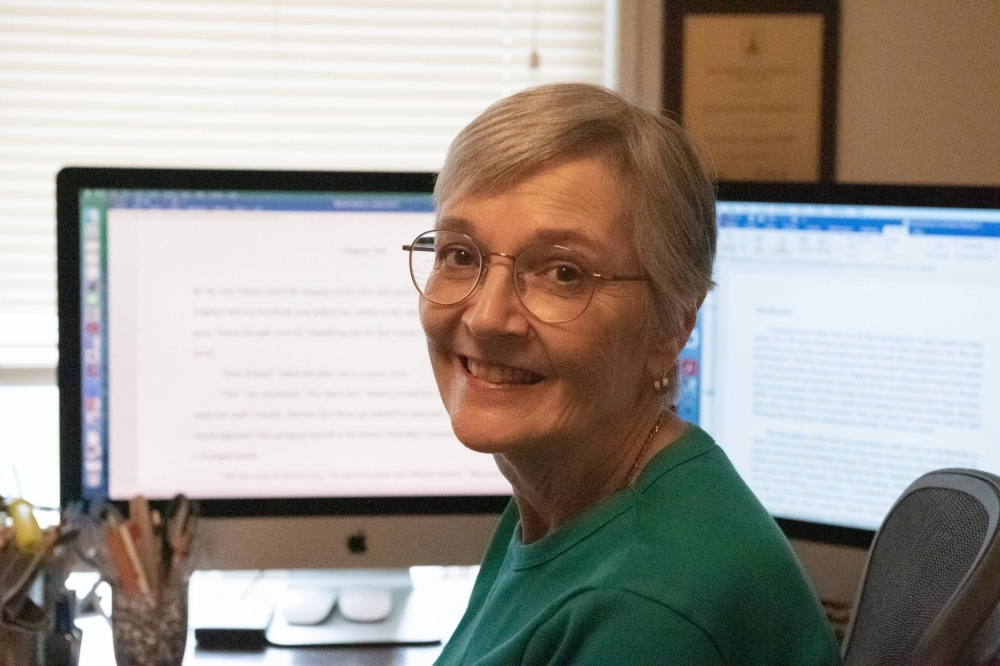Diane Hawley Nagatomo: ‘The only way to improve writing is to write’

Diane has published a wide variety of academic texts throughout her career but has just released her first novel, “The Butterfly Cafe.” | LOUISE CLAIRE WAGNER
BY LOUISE GEORGE KITTAKA
CONTRIBUTING WRITER
SHARE
Sep 23, 2023
Born in Buckinghamshire, U.K. and raised in the U.S, Diane Hawley Nagatomo, 66, has called Japan “home” for more than 40 years. Nagatomo, who retired from her position as a professor at Tokyo’s Ochanomizu University in 2022, has published a wide variety of academic texts throughout her career but has just released her first novel, “The Butterfly Cafe.”
1. What brought you to Japan and what has kept you here? I came to Japan for the second time in 1979, following my Japanese boyfriend and thinking I’d stay a year. We’ve now been married for 43 years!
2. You’ve just released your debut novel, “The Butterfly Cafe.” What’s it about? American Jessie Yamada is making plans to leave her emotionally abusive Japanese husband. When he is suddenly killed in a traffic accident, she discovers that her marriage had been built upon deceit and lies. However, with the help of old and new friends, she builds a life and a new family for herself in Tokyo.
3. Is there any part of yourself in your heroine Jessie? Not really. Jessie’s background, her struggles in Japan and how she overcomes her difficulties are unlike any of my own experiences.
4. What inspired you and what research did you do? The story is fiction, but I’ve met resilient foreign women making their lives in Japan, sometimes experiencing great hardships in difficult circumstances. Jessie may be a composite of all those women. References to Japanese history — particularly the Edo (1603-1868) and Meiji (1868-1912) periods — came from my research into the history of language education in Japan.
5. “Japan through the eyes of a foreign national” is a growing genre. What fresh perspective do you bring with Jessie’s story? I used to have a T-shirt saying, “A family is a circle of friends who loves you.” I wanted to show that families aren’t necessarily the ones you’re born into, they’re the ones you make. Setting the story in Japan is logical. They say “write what you know,” and after decades in Japan, that was the only thing I could do.
6. Which Japanese or Japan-based writers do you admire? One would definitely be Suzanne Kamata, a Shikoku-based writer of novels, short stories and essays. She’s been a real trailblazer for the expat writing community. Another fantastic writer is long-term Japan resident (and former Japan Times columnist) Karen Hill Anton. Her book, “The View from Breast Pocket Mountain,” is my favorite memoir.
7. How long did it take from first draft to publication? Four years — one year to write and three to revise. However, I wasn’t working on it much during the first two years of the pandemic.
8. What were the biggest challenges along the way? I had to reduce the level of formality and consider subplots and love interests. You don’t have those worries with academic writing, which is fact-based and straightforward. The biggest challenge, though, was finding an agent or publisher. I can proudly say I’ve received far more rejections than J.K. Rowling ever did!
9. How did you overcome them? I revised and revised again. One publisher suggested cutting the first four chapters. That was excellent advice, but then I still got rejected by that publisher. In 2022, I submitted the new version to Black Rose Publishing and was thrilled when I was offered a contract.
10. As a newcomer to the fiction world, what has been one of the biggest surprises? Certainly, it was much harder finding a publisher for fiction than it was for my academic books or EFL textbooks. It was also surprising to learn that indie writers, and not the publisher, are responsible for book promotion.

Diane Hawley Nagatomo at her home office in Chiba. Born in the U.K., Diane has called Japan “home” for more than 40 years. | LOUISE CLAIRE WAGNER
11. How have you been promoting the novel since it came out? Mostly through various social media groups and through friends. If only I knew a TikTok or YouTube influencer — that would make things so much easier.
12. When the initial batch of printed copies arrived, who got the first one? My daughter Alicia Guercio, who read early drafts and gave me some content feedback, got the first signed copy.
13. Any advice for other budding writers out there? Don’t be afraid of or offended by constructive criticism. The only way to improve writing is to write, regardless of how painful or personal that may feel. Make changes as necessary and keep what you believe in.
14. You’ve already been widely published, with your academic research and EFL textbooks. Why try fiction? I’ve always been a voracious reader, and I always wanted to write a novel. Even my academic area — narrative research — involves storytelling to a certain extent. It was kind of a natural transition.
15. What made you enter the teaching profession at the tertiary level? I had originally planned to be an elementary school teacher. After my “one” year in Japan turned into two, three and then four, I stumbled into university teaching. I obtained an MA in my 30s and a Ph.D. in my 50s.
16. The experience of women in language teaching has been a major theme for your research. What prompted this? My research began with Japanese university teachers’ professional identities. I saw how gender influenced every aspect of my participants’ careers. After that, I examined foreign female English teachers’ professional identities in different educational contexts. Then, two colleagues (Kathleen Brown and Melodie Lorie Cook) and I published an edited volume: “Foreign Female English Teachers in Japanese Higher Education: Narratives from our Quarter.”
17. You’ve mentored many female academics coming along behind, too. Why is this important? I got my start in Japanese universities thanks to two Japanese mentors who were both male. I realize women don’t always receive that sort of support, and thankfully groups now exist that support and mentor women. However, I am also happy to mentor young male academics, because it’s so satisfying to see a talented person’s career take off.
18. What advice can you offer for women in hoping for an academic career? My advice would be to finish that Ph.D. when you are as young as possible — don’t put your education on hold as many women seem to do. Be willing to invest in yourself. Universities are actively hiring female researchers now, but they are looking for young professors who will have a long career ahead of them.
19. What have you been up to since retiring in 2022? I now teach part time at three universities. I love teaching, so I’m not ready to leave the classroom yet. I was, however, more than ready to leave faculty meetings and entrance examination committee work behind!
20. You’re already working on your next novel. Anything you can share? My next novel is yet to be named but it’s about a young Japanese woman who inherits two farms in rural Nebraska from her long-lost father. Fingers crossed that it will be published in 2024 or 2025.
KEYWOR
No comments:
Post a Comment